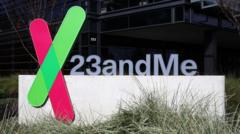As we look back at the last three years, 23andMe, once a frontrunner in genetic testing, has seen its fortunes reverse drastically. Initially lauded as a pioneering firm with a skyrocketing share price that once surpassed Apple's, the company is now grappling with an alarming decline. Having narrowly avoided delisting from the stock market recently, its shares now hover around an astonishingly low $5 after peaking at a high of $321, placing its worth at a mere 2% of what it was.
The trajectory of 23andMe’s downfall can be attributed to a couple of key factors. Experts indicate that the company has struggled to create a sustained business model. After customers received their DNA reports, there remained little incentive for repeat business. Efforts to monetize an anonymized version of its vast DNA database for drug research have also fallen short, hindered by the lengthy process of drug development.
Dimitris Andriosopoulos of Strathclyde University offers a sobering perspective, suggesting that while 23andMe may continue to linger, the firm's prospects for long-term survival are grim. The shakeup in leadership has only exacerbated matters, with most of the original board resigning, leaving co-founder and CEO Anne Wojcicki as the last standing original member. Whispers of a potential sale linger in the air, although 23andMe contends that Wojcicki aims to lead the company toward privatization rather than entertain a buyout.
However, the broader implications of 23andMe's predicament are startling, particularly regarding the user data it has amassed. Carissa Veliz, an advocate for privacy awareness, points out the unique risks associated with genetic data, significantly impacting not only individuals who have tested but also their relatives. The protection and ethical handling of this sensitive information cannot be overstressed, especially in light of a recent breach.
Despite 23andMe's assurances of stringent data protections and the legal frameworks in place, concerns persist about the potential misuse of genetic information. Experts suggest a tougher stance on personal data trading is essential to safeguard against future risks. Until such measures are enacted, consumers remain vulnerable, as highlighted by the general predicament facing 23andMe—an emblematic tale of how tech success can quickly devolve into chaos.





















